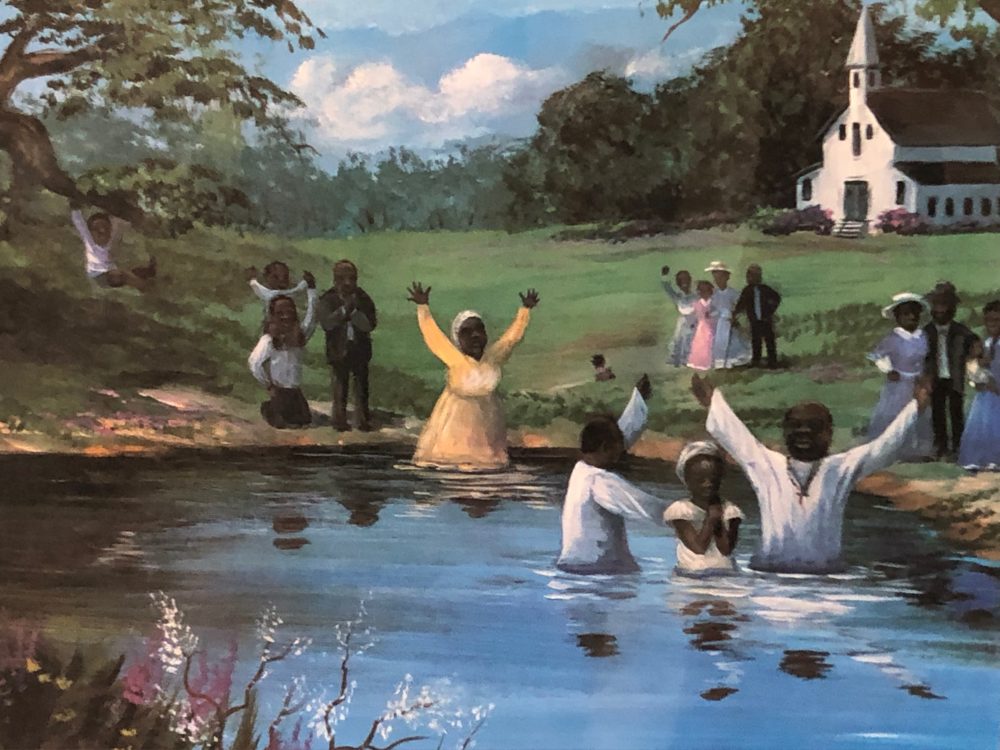Job and the Super Bowl
Zoé Chevalier | zc2504@columbia.edu

Fewer congregants come to Bible study on Wednesdays than on Sundays at the United Pentecostal Church in Harlem. But it is no less spirited. On a recent Wednesday, seven worshippers sit in the prayer room in front of Pastor Michael Granttan. Despite his whitening hair, Grattan is an energetic man, often jumping to his feet to illustrate a lesson. He is dressed in casual clothes: A knitted sweater and pants have replaced the suit of Sunday’s service.
Grattan’s teaching style is a combination of Bible verse study, personal anecdotes, sports references and modern-day cultural applications. During the first part of the lesson, people in the audience are encouraged to ask all the questions they want, both Biblical and personal.
A young woman, whom I recognize as one of the singers of Sunday’s service, starts off by asking, “How do we know if the hardship we have been given comes from God?”
She proceeds to tell the tale of a family member who had been diagnosed with breast cancer and refused treatment, waiting for God to cure her. One day, she went to a naturopathic doctor who gave her an ointment to put on her breast. This, she said, led to an emergency mastectomy. The woman found out that during the year and a half that she had not been given treatment, the tumor had not metastasized. She praised God for protecting her. Her husband, however, blamed her for losing faith and getting the surgery, saying that God was not done curing her.
Hearing this story, Grattan stands, raises his arms and starts preaching the story of Job from the Book of Job, which is part of the Old Testament.
“Job’s animals were kidnapped!
The house fell over his children!
And then he got sick! And we know there is nothing more personal than disease. There was puss coming out of his body, it was truly horrible, but he never stopped praising the Lord.”
Grattan then uses one of his favorite sports allegories to illustrate his message: “Job was hit so hard, like in a boxing ring, poom the boxer, he got a hit with a right fist then a left fist, then he got a full-body blow!” Mimicking the scene he throws his fists in the air, punching an invisible Job.
Soon, he sits back down, saying, “We know that God gave him those hardships, but generally speaking, there are no parameters that define whether or not a hardship comes from God, we create a lot of our own problems, but we need to continue to praise God no matter what.”
He adds that he believes in going to the doctor, because “God can cure you anywhere, on the operating table as well as in your kitchen, so let him cure you though your doctor.” With a deep sigh, he concludes: “I understand, as you know sister Grattan died recently.” The crowd goes silent. Everyone knows about the recent death of the pastor’s wife to cancer.
During the second half of the session, Grattan doesn’t shy away from getting into contemporary pop-culture discussions. He comments on the Superbowl half-time show, featuring Shakira and Jenifer Lopez, saying, “I don’t understand all the fuss about the fact that it was not family-friendly.” When someone brings up that Jennifer Lopez might have been mocking the sign of cross, he defends her. “No! She was simply pole dancing!”
Grattan often tries to tone down more conservative branches of the church. “I believe in balance. God is not stupid, only human beings are. Be careful about turning principles into law.” When someone in the church asks if women are allowed to wear pants, he says of course. “And what about swimsuits?” asks a man. “Is it true we are not allowed to go to the beach or swimming pool even on a hot day?” Another woman laughs. “I go to the beach!” she says. Grattan ends the discussion saying, “Yes you can. I also believe that there are apostolic swimsuits that are more modest.”
At the end of the study session, Grattan gets more serious, and passes around a sheet of paper: “A brief look at the errors of the doctrine of the Trinity.” The document is filled with typos as the pastor has “whipped it out” quickly this afternoon. Once again, Grattan stands up, agitated.
“99 out of a 100 times, 999 out of 1000 times..”
His voice grows louder.
“9999 out of 10000, and I could keep going… people turn to Genesis 1:26 to justify that God is plural.”
Genesis 1:26 is part of the Old Testament and says: Then God said, “Let us make mankind in our image, in our likeness, so that they may rule over the fish in the sea and the birds in the sky, over the livestock and all the wild animals,[a] and over all the creatures that move along the ground.”
Everyone pulls out their phones to look up the verse, and the pastor continues. “Scholars understand that this is not what this verse means, the clergy understands, but no one is teaching laypeople!” According to the Pentecostal Church, God, Jesus and the Holy Spirit are all part of the same entity, not separate beings. He sits back down: “Do you understand?”
A woman in the back raises her hand shyly. “I think that it will make sense once I really go through the scripture,” she says.
“Yes, you need to keep asking questions and work hard, I can’t give you understanding,” Grattan concludes. As the clock strikes 9 p.m., all rise and pray together.
